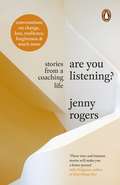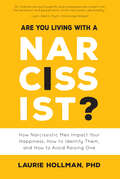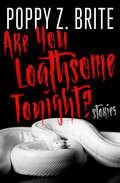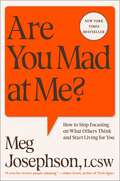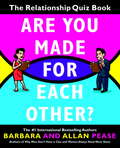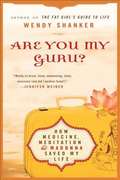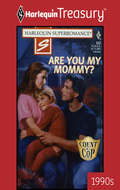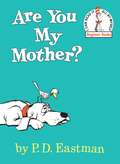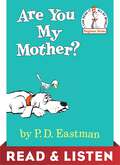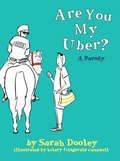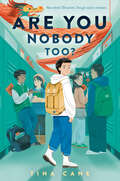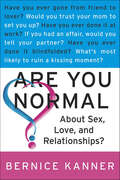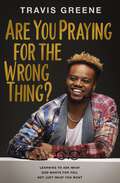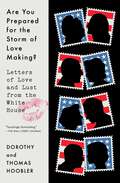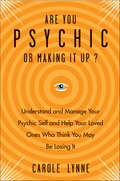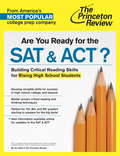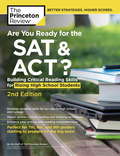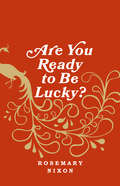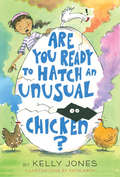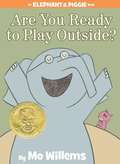- Table View
- List View
Are You Listening?: Stories from a Coaching Life
by Jenny Rogers'Absorbing' - The Guardian'Are You Listening? is a real gem: full of insights about the human psyche, non-fiction, as gripping as a novel' - Miranda Levy, author of THE INSOMNIA DIARIES on TwitterIt is very rare as an adult to find a place where you are not judged, where you can be open, honest and vulnerable: that is exactly what coaching provides. Through twenty stories from her 32 years in the coaching room, Jenny demonstrates how even the most successful people can be held back by doubts, limitations and human dilemmas, such as: · 'Can I be my real self at work?'· 'What's my purpose in life?'· 'How do I deal with unhappiness and disappointment?'· 'Should I go for a job where I get paid a fortune but know I'd be miserable?'Through these moving, beautifully written stories, Jenny reflects on the meaning of modern relationships, demonstrating how the courage to be vulnerable can make a huge, transformative difference to the quality of all our lives. 'Jenny Roger cherishes the core of truth in each of us' - Sally Helgesen, author of HOW WOMEN RISE
Are You Living with a Narcissist?: How Narcissistic Men Impact Your Happiness, How to Identify Them, and How to Avoid Raising One
by Laurie HollmanWhat’s the difference between narcissism and normal love? In the current political and social climate, narcissistic tendencies are coming under more scrutiny, but there are so many nuances to navigate, and many women don't know how to identify or respond to narcissists when they meet them, especially if they happen to be in their own home. In Are You Living with a Narcissist?, psychoanalyst Laurie Hollman, PhD, helps you identify the narcissists in your life and recognize the effect they have on your family and happiness—and what to do about it. This groundbreaking, thoroughly researched guide explores:the symptoms of Narcissistic Personality Disorder;the spectrum of healthy to pathological narcissism;how to raise a child so that he does not become a narcissist;how spouses of narcissists can live happy, healthy lives;the relationship between male narcissism and violence;the impact of culture on narcissism;and more!
Are You Loathsome Tonight?: Stories
by Poppy Z. BriteTales of &“fearlessly offbeat&” horror from the author of Lost Souls and Exquisite Corpse (Locus). Poppy Z. Brite, an acclaimed horror fan favorite, is known for going to the edge and back—and this collection of stories, many set against the backdrop of the author&’s native New Orleans, explores the outermost regions of murder, sex, death, and religion. Featuring titles such as &“In Vermis Veritas,&” &“Entertaining Mr. Orton,&” and &“Mussolini and the Axeman&’s Jazz,&” as well as collaborations with Christa Faust and David Ferguson, this volume also offers notes on each story by the author, an introduction by #1 NewYork Times–bestselling author Peter Straub, and an afterword by Caitlín R. Kiernan. Are You Loathsome Tonight? is an edgy, gruesome tour of &“the darkness at the heart of things [with] a number of superb stories, powerful in style and characters&” (Locus).
Are You Mad at Me?: How to Stop Focusing on What Others Think and Start Living for You
by Meg JosephsonFrom psychotherapist and social media star Meg Josephson, a groundbreaking &“cure for chronic people-pleasing&” (Adam Grant, #1 New York Times bestselling author) that explores the common survival instinct called fawning and offers &“explanations, comfort, and best of all, solutions&” (Christie Tate, New York Times bestselling author).Are you... - Constantly worried about what people think of you, if they like you, if they&’re mad at you? - The eldest daughter and/or the angry daughter? - Anxious, a perfectionist, or an overachiever? - Always overextending yourself (and then resentful)? - Someone who avoids conflict at all costs? - Fearful of getting into trouble or being seen as &“bad&”? - Silencing your needs for the comfort and happiness of everyone else? - Prone to overexplain or over apologize? - Eternally obsessing over why someone texted with a period instead of an exclamation point? Psychotherapist Meg Josephson is here to show you that people-pleasing is not a personality trait. It&’s a common survival mechanism known as &“fawning&”: an instinct often learned in childhood to become more appealing to a perceived threat in order to feel safe. Yet many people are stuck in this way of being for their whole lives. Are You Mad at Me? weaves Josephson&’s own moving story with that of fascinating client stories and thought-provoking exercises to show you how to: - Identify all the roles you might play—from peacekeeper to performer to caretaker to lone wolf to perfectionist to chameleon—that keep you far from yourself. - Stop fearing your thoughts and emotions, even if they&’re unpleasant. - Rethink conflict and boundaries as an opening for deeper connection. - Practice &“leaning back&” in relationships. - Recognize when people-pleasing is actually necessary (with your chaotic boss) and when it&’s not (with your close friends) and stop self-loathing when you slip into old patterns. - Shift away from the familiar chaos, anxiety, and resentment you&’re used to as you move closer to yourself and a life that no longer depletes you—but brings you joy. With Josephson&’s &“lucid prose and smart mix of clinical expertise, personal disclosure, and pertinent case studies&” (Publishers Weekly), Are You Mad at Me? will help you shed the behaviors that are keeping you stuck in the past so that you can live in your most authentic present.
Are You Made for Each Other?
by Allan Pease BarbaraPut your partner to the test and find out just how well you know one another. After more than thirty years of research into how relationships work and where they often go wrong, Allan and Barbara Pease devised this clever quiz book to help you determine how compatible you and your partner are. The special quizzes, to be taken by yourself and with your partner, will help you clear up common misunderstandings and communicate better. A unique blend of in-depth research, witty insight into human nature, and humor, Are You Made For Each Other? will help your relationship--and make you laugh as you learn.
Are You Missing the Real Estate Boom?: The Boom Will Not Bust and Why Property Values Will Continue to Climb Through the End of the Decade - And How to Profit From Them
by David LereahAreyoumissing the real estate boom? Can you increase your wealth from it? For most people—including current homeowners—the answer is a resoundingyes. But it’s not too late to increase your stake in the greatest real estate boom of our generation. Whether you are a first-time buyer or already own your home,Are You Missing the Real Estate Boom?will show you how you can dramatically increase your overall wealth. Author David Lereah, chief economist for the National Association of Realtors, shows why the real estate market is poised to climb higher over the next decade—and explains what you can do to profit from it. Lereah calls today’s market a “once-in-every-other generation opportunity. ” Today's boom is not just driven by low interest rates—there are a host of demographic and economic reasons why real estate will continue to outpace other investments, from the growing needs of the baby-boomer generation and the rise of the “echo” boomer generation to the new ways real estate is marketed and sold. Are you a first-time buyer? A current homeowner considering whether or not to trade up? There has never been a better time to do so, Lereah convincingly claims. InAre You Missing the Real Estate Boom?, Lereah explains what to look for when you’re buying a home; which improvements add the most value to your current home; what to consider when purchasing rental properties; how to evaluate real estate investment trusts (or REITs); and the pros and cons of second homes. Full of detailed information on how to work with a real estate agent and a mortgage lender, how to analyze local markets and regional fluctuations, and how to best finance your investment,Are You Missing the Real Estate Boom?offers readers the seasoned advice they need to invest with confidence and reap outsized rewards. Are You Missing the Real Estate Boom?author David Lereah, chief economist for the National Association of Realtors®, asks. We are experiencing a historic wealth-building opportunity. To ensure that your don’t miss out, Lereah provides the tools, information, and analysis you need to become a savvy real estate investor. And he shows how to integrate real estate into your overall investment strategies and financial planning goals. Among the information you’ll find in the book: • How to become a master at dealing with real estate agents, brokers, and lenders. • Which home improvements will result in the greatest long-term gains. • How to identify the vacation homes and regions that will increase the most in value. • How to finance a first-time home—with or without a big down payment. The long-term fundamentals for housing remain strong into the foreseeable future, claims Lereah. Far from a real estate “bubble,” what we are experiencing today is a phenomenon that takes place only once every other generation: a long-term real estate market expansion. Isn’t it time you started taking advantage of it today?
Are You My Guru?
by Wendy ShankerRead Wendy Shanker's blogs and other content on the Penguin Community. From the author of The Fat Girl's Guide to Life—an insightful and humorous memoir of one woman's quest to navigate the world of alternative healing. At age 33, Wendy Shanker was on the verge of Have It All-itis: a Midwestern girl living in Manhattan, writing for television, mingling with celebrities, and publishing her first book. Plus, she had a fierce haircut. Life was good. Then suddenly, it wasn't. Diagnosed with a rare autoimmune disease, Wendy knew she was in for it- at the very least a cocktail of chemo and steroids (certain to challenge her body image), a bustling career put on hold, and a major hurdle to her dating life. When she ran out of medical options, Wendy found herself exploring everything from acupuncture, colonics, and energy healing to detox retreats, tarot card readers, and an intuitive therapist who wanted her to talk to her liver. Surely there must be a guru somewhere who can fix everything-right? Watch a Video .
Are You My Mommy?
by Kay DavidCOUNT ON A COP Would you do the smart thing or the right thing? Late one night, a little boy approaches Abbie Franklin. He doesn't know his name or where he lives. Abbie has no choice but to help him--any way she can. Even if that means dealing with her ex-husband, Ray Menendez. Ray's a cop. He knows the smart thing would be to turn the kid over to the proper authorities. Especially if Abbie's involved. Their marriage is over, but he still doesn't want Abbie to get hurt. And she will--if she starts to care about a child who isn't hers. But sometimes the smart thing isn't the right thing.
Are You My Mother?
by P. D. Eastman<P>A baby bird goes in search of his mother in this hilarious Beginner Book edited by Dr. Seuss. When a mother bird's egg starts to jump, she hurries off to make sure she has something for her little one to eat. But as soon as she's gone, out pops the baby bird. He immediately sets off to find his mother, but not knowing what she looks like makes it a challenge. The little hatchling is determined to find his mother, even after meeting a kitten, a hen, a dog, and a Snort. The timeless message of the bond between mother and child make P. D. Eastman's Are You My Mother? A must for baby showers, beginning readers, and Mother's Day. <P>Originally created by Dr. Seuss, Beginner Books encourage children to read all by themselves, with simple words and illustrations that give clues to their meaning. <P>[This text is listed as an example that meets Common Core Standards in English language arts for K-1 at http://www.corestandards.org.] <P>Images and descriptions available.</P>
Are You My Mother? Read & Listen Edition (Beginner Books(R))
by P.D. EastmanYour kids will enjoy this classic story even more in this beautiful Read & Listen edition. A baby bird is hatched while his mother is away. Fallen from his nest, he sets out to look for her and asks everyone he meets—including a dog, a cow, and a plane—"Are you my mother?"This ebook includes Read & Listen audio narration.
Are You My Mother?: Instructional Guides For Literature (Beginner Books(R))
by P. D. Eastman<P>When Baby Bird hatches from his egg, his mother is off looking for food. What's a bird to do? Go find his mother, of course! So begins Baby Bird's hilarious, and at times very touching, hunt for his mother. <P>[This text is listed as an example that meets Common Core Standards in English language arts for K-1 at http://www.corestandards.org.] <P>Images and descriptions available.
Are You My Uber?: A Parody
by Sarah Amelia DooleyWe've all been there. You call an Uber. The app says it has arrived, but . . . where is it? Where is your Uber?Are You My Uber? is a 21st Century parody of the 1960 P.D. Eastman children's book Are You My Mother? A man steps off the midnight bus at Port Authority. His name? Unknown. His goal? To find his Uber, an elusive Ford Taurus. Lost and alone in a new city, he steels himself and begins by passing right by the very object of his search. Hilarity ensues: the man proceeds to knock at the doors of an off-duty cab, a helicopter, a halal cart, and other vehicles increasing in their absurdity, willing to try anything to find his Uber.Paired with illustrations by Hilary Fitzgerald Campbell, co-illustrator of Feminist Fight Club, Sarah Dooley's hilarious imagined story is as ridiculous as it is relatable.
Are You Nobody Too?
by Tina CaneAfter years of discomfort as the only Chinese student at her private middle school, Emily transfers to Chinatown's I.S. 23 for 8th Grade and ends up feeling more disconnected than ever. In this coming-of-age novel-in-verse, will Emily be able to find her way or will she lose herself completely?After a year of distance-learning, Emily Sofer finds her world turned upside down: she has to leave the only school she's ever known to attend a public school in Chinatown. For the first time, Emily isn't the only Chinese student around...but looking like everyone else doesn't mean that understanding them will be easy--especially with an intimidating group of cool girls Emily calls The Five.When Emily discovers that her adoptive parents have been keeping a secret, she feels even more uncertain about who she is. A chance discovery of Emily Dickinson's poetry helps her finally feel seen. . . but can the words of a writer from 200 years ago help her open up again, and find common ground with the Five?
Are You Normal About Sex, Love, and Relationships?
by Bernice KannerWhen it comes to sex and love, how do you fit in? Are you...ahem, normal? Do you conform to the type, standard or pattern, the way MOST people do? In the bedroom--and elsewhere where we copulate--we're both entirely predictable and utterly surprising.*Would you try to conceive without your partner's consent if you wanted a baby?*What's sexier: suits, slacks, or jeans?*Do you slant to the right or left when kissing?*Have you ever lied to get a date?Marketing guru Bernice Kanner has spent many years researching how Americans love and lust to give us the statistics to satisfy our every curiosity. People talk about sex a lot--a worry about it even more. So pull up a chair and see how you compare...
Are You Paying Too Much for That Acquisition?
by Robert G. Eccles Thomas C. Wilson Kersten L. LanesDespite 30 years of evidence demonstrating that most acquisitions don't create value for the acquiring company, executives continue to make more deals, and bigger deals, every year. There are plenty of reasons why value isn't created, but many times it's simply because the acquiring company paid too much. It's not, however, that acquirers pay too high a price in an absolute sense. Rather, they pay more than the acquisition is worth to them. What is that optimum price? The authors present a systematic way to arrive at it, involving several distinct concepts of value. In today's market, the purchase price of an acquisition will nearly always be higher than the intrinsic value of the company--the price of its stock before any acquisition intentions are announced. The key is to determine how much of that difference is "synergy value"--the value that will result from improvements made when the companies are combined. This value will accrue to the acquirer's shareholders rather than to the target's shareholders. The more synergy value a particular acquisition can generate, the higher the maximum price an acquirer is justified in paying. Just as important as correctly calculating the synergy value is having the discipline to walk away from a deal when the numbers don't add up. If returns to shareholders from acquisitions are no better in the next ten years than they've been in the past 30, the authors warn, it will be because companies have failed to create systematic corporate governance processes that put their simple lessons into practice.
Are You Poisoning Your Pets?
by Nina Anderson Howard PeiperAre You Poisoning Your Pets delves into the many issues that can arise for our animals with the commonly used products on the market today for cleaning, household repair, even for how we approach fleas and other pests-- a must read if you want to keep your pet healthy and happy for years to come.
Are You Praying for the Wrong Thing?: Learning to Ask What God Wants for You, Not Just What You Want
by Travis GreeneThe Bible tells us to pray continually and without ceasing, but what happens when we're waiting for God but discover He's waiting for us? In his first book, pastor and recording artist Travis Greene guides the reader to apply Biblical truths for a fulfilled life.Praying and waiting for God to answer can be confusing. When something--or everything--feels stuck because God doesn't seem to be answering our prayers, what next? Pastor and Grammy–nominated recording artist Travis Greene issues a challenge and asks us to examine our prayers--Are we praying for the right thing? Are we planning and preparing for what we've asked for? Are we praying for our will to grow closer to His? Or do we sometimes treat him like a genie in a bottle? Using Biblical examples, Travis invites readers to reconsider our prayers andnavigate beyond feeling trapped to thriving in God&’s purposes;learn to use what's left instead of focusing on what was lost;be willing to forgive, wait, and work as God allows; andbelieve in God's miracles while being a faithful steward of what He has already provided.Sometimes what happens next depends on the choices made right now. And sometimes God has something else in mind for us--something we might never have imagined, or in a way we might not have imagined it! It's possible to press forward into a life filled with joy and expectation for the future! Like the widow who used the oil she had at hand, by using what God has already supplied, Travis encourages the readers that they may be closer to enjoying God's promises than they realize. Management can be a magnet for miracles.
Are You Prepared for the Storm of Love Making?: Letters of Love and Lust from the White House
by Dorothy Hoobler Thomas HooblerAn &“irresistibly readable&” (David Michaelis, New York Times bestselling author of Eleanor) collection of love letters by American presidents to their wives—and lovers—revealing an intimate and deeply personal side of our leaders.Our presidents loom so large in history that we often forget they are human. Are You Prepared for the Storm of Love Making? is a collection of handwritten love letters that offers a surprising and intimate portrait of the men who occupied the White House. From George Washington to Barack Obama, these are not the presidents we see in history books. &“In this varied (and variously entertaining) assortment of excerpted letters…a careful reader will see in the decorous prose of…George Washington and Thomas Jefferson that the hearts of real men beat beneath their stiff frock coats, too.&” (The Wall Street Journal) Some of the letters are incredibly romantic—and surprisingly so. It took Richard Nixon years to convince Pat Ryan to marry him: &“Someday let me see you again? In September? Maybe?&” Others will make you blush. Staid-looking Woodrow Wilson, about to return home from a trip, warned his wife of ten years: &“Do you think you can stand the unnumerable kisses and the passionate embraces you will receive? Are you prepared for the storm of lovemaking with which you will be assailed?&” In letters to one of his mistresses, Warren G. Harding referred to his penis as &“Jerry&”—letters which would later be used to blackmail him. All the letters show the writer at his most vulnerable. We see letters of sorrow written about the death of a child or during a time of separation while the president was away on the battlefield. This &“lovely book, stuffed with romantic details…[is] a helpful reminder that historical figures are also human beings: petty, sappy, and flawed&” (The New York Times Book Review), revealing a never-before-seen side of the men we still honor today.
Are You Psychic or Making It Up?: Understand and Manage Your Psychic Self and Your Loved Ones Who Think You May Be Losing It
by Carole LynneA road map for people who think they may be psychic—and their loved ones Are You Psychic or Making It Up? is a must-have book for anyone who is having psychic or mediumistic experiences (and possibly thinks they're going crazy) and their friends and families. Carole Lynne begins with some badly needed truths. Chief among them: not everyone is psychic. While everyone can develop their intuition and get in touch with the inner psychic voice, those who are psychic and mediumistic have received special spiritual gifts. If that sounds familiar, this is definitely the book for you. Learn how to take care of your "extra sensitive self." Learn how to evaluate your experiences and to make choices about whether to further develop your gifts. Get advice on what type of further training and study you might benefit most from. And, for friends and families, learn to appreciate your psychic loved ones and that it is an honor to be psychic. Carole Lynne writes from authority earned over decades of personal experience and study, teaching, and working with clients, many of whom come to her for mediumistic readings. Others come to her to learn how to develop their own psychic and mediumistic powers. It is those people and the thousands more like them who will benefit from this book.
Are You Ready for the SAT & ACT?
by Princeton ReviewIs your 7th, 8th, or 9th-grader ready for the SAT and ACT? Build a solid foundation in the critical reading skills students need to succeed on the verbal portions of the SAT and ACT with The Princeton Review!Whether or not you like it, the truth is that scoring well on standardized tests is undeniably important in today's academic environment. The verbal portions of both the SAT and ACT test important reading comprehension skills that many students are unprepared for--or need extra help with. As parents know, the Redesigned SAT is looming on the horizon for rising high school students (those taking the exam in 2016 or beyond). The power of a single word and its variability in meaning in relation to its surrounding context is a core skills-building component in Are You Ready for the SAT & ACT?, which directly addresses the more layered analytical thinking that will be requisite for the Redesigned SAT. With this book, The Princeton Review brings you a focused, strategic approach to improving crucial reading skills for both exams. With this book, you'll find: A Strategic Approach to Sharpening Your Skills * Zero in on specific wording to unlock hidden info * Pinpoint the primary purpose of reading passages * Discover the language of argument and its implicationsFun, Engaging Activities and Drills * Identify the "puzzle pieces" that make up words * Decpiher unfamiliar vocabulary with context clues * Conquer difficult paragraphs by "trimming the fat"From the Trade Paperback edition.
Are You Ready for the SAT and ACT?, 2nd Edition
by Princeton ReviewIt's never too soon to start preparing for the SAT and ACT. From the experts at The Princeton Review, this book helps ambitious 7th, 8th, and 9th graders build the critical reading skills they need to succeed on both tests and beyond!Whether or not you like it, the truth is that scoring well on standardized tests is undeniably important in today's academic environment. The SAT and ACT verbal portions test important reading comprehension skills that many students are unprepared for--or need extra help with. In this book, The Princeton Review brings you a focused, strategic approach to improving crucial reading skills for both exams. Inside, you'll find: A Strategic Approach to Sharpening Your Skills * Zero in on specific wording to unlock hidden info * Pinpoint the primary purpose of reading passages * Analyze source texts, brainstorm, and compose your essays to best effectFun, Engaging Activities and Drills * Identify the "puzzle pieces" that make up words * Decpiher unfamiliar vocabulary with context clues * Tackle practice SAT and ACT essay promptsThis book has been specially formatted for on-screen viewing with cross-linked questions, answers, and explanations.
Are You Ready to Be Lucky?
by Rosemary Nixonre You Ready to Be Lucky? If so, meet Roslyn, a spirited divorcée eager for new beginnings. Meet Duncan, a British conman with a penchant for collecting ex-wives. Meet Floyd, a hard-living contractor who can fix anyone's house but his own. Irritating, vulnerable, hopeful, they ricochet off one another, trailing a mess of family and friends, all of them trying to beat the odds and find happiness. With razor-sharp wit, Rosemary Nixon takes on the chaos and absurdity of friendship, marriage, divorce, and betrayal—and the heart-pounding, breathtaking, always astonishing complexities of luck and love.
Are You Ready to Hatch an Unusual Chicken? (Unusual Chickens #2)
by Kelly Jones Katie KathThis laugh-out-loud sequel to Unusual Chickens for the Exceptional Poultry Farmer has EVEN MORE MAGIC CHICKENS! <P><P>Twelve-year-old Sophie Brown is finally settling into her new home and her new role as keeper of some highly unusual chickens--chickens with secret superpowers! But the arrival of two new magical chickens for her flock and some unusual eggs to be incubated and hatched (what will their superpowers be?), plus an impending inspection from the Unusual Poultry Committee (who even knew this existed?) has Sophie feeling pretty stressed out. Her older cousin, Lupe, is coming to stay with her family, which is great--but will Lupe like chickens too? And on top of it all, Sophie's first day at her new school is rapidly approaching! In this wildly funny and quirky novel told in letters and lists and quizzes, Sophie learns that even an exceptional poultry farmer can use some help.
Are You Ready to Play Outside? (An Elephant and Piggie Book)
by Mo WillemsMeet Elephant Gerald and Piggie. Gerald is careful. Piggie is not. Piggie cannot help smiling. Gerald can. Gerald worries so that Piggie does not have to. Gerald and Piggie are best friends. In Are You Ready to Play Outside? Piggie can't wait to go play in the sunshine. But will a rainy day ruin all the fun?<P><P> Winner of the Theodore Seuss Geisel Medal
